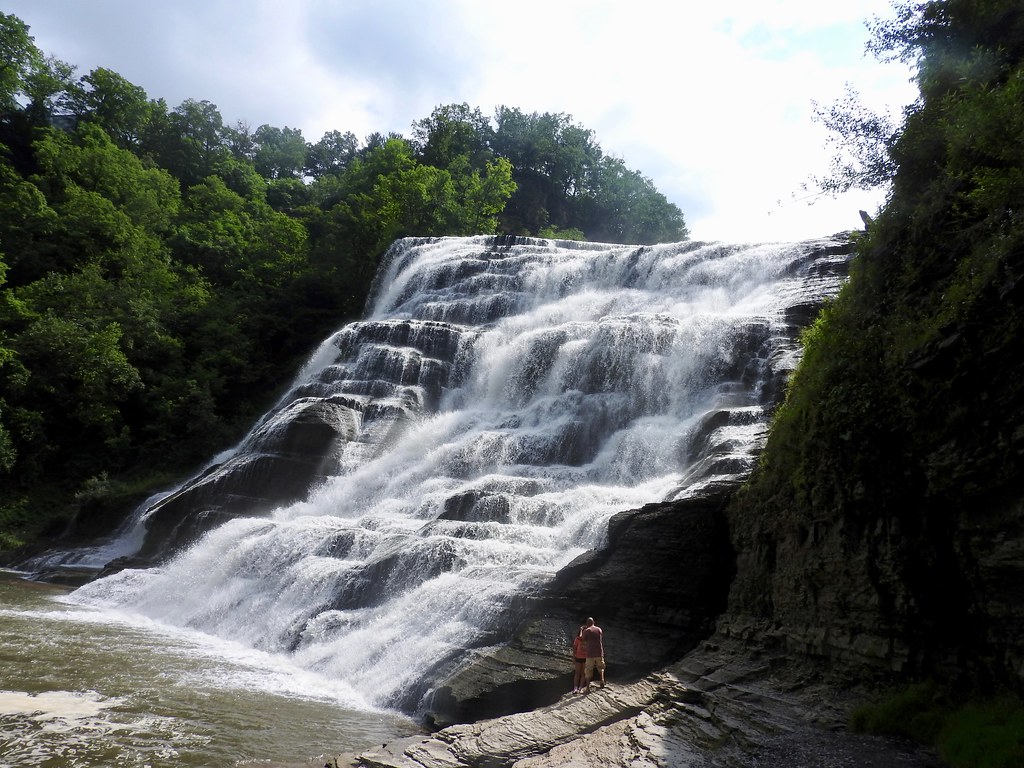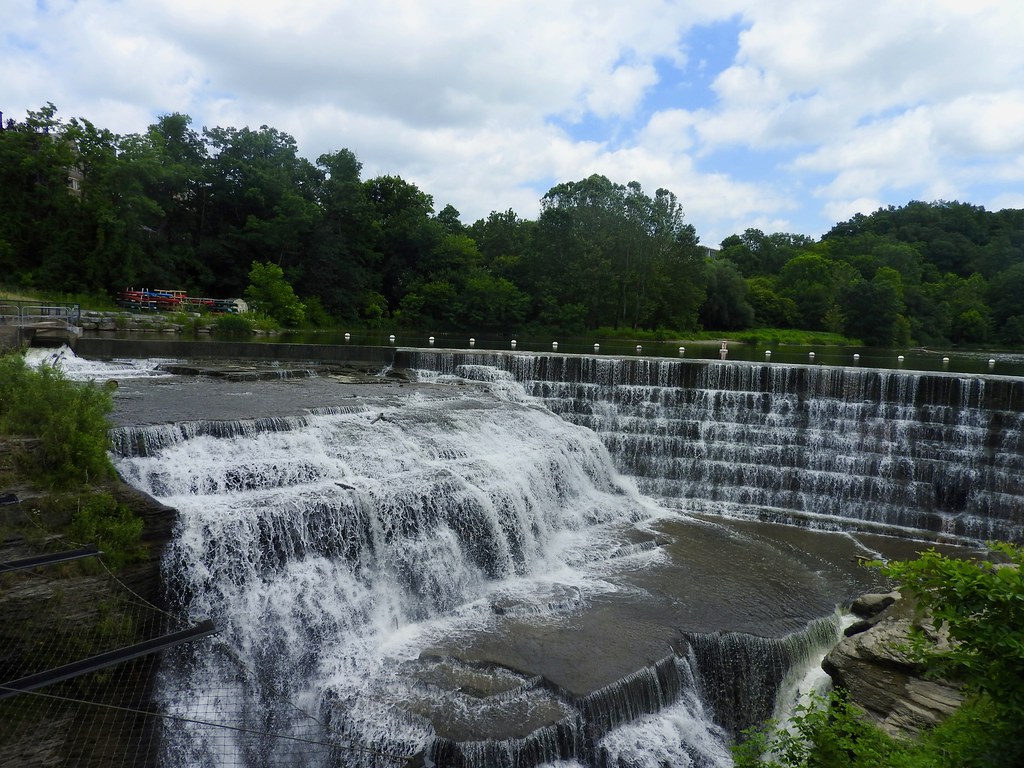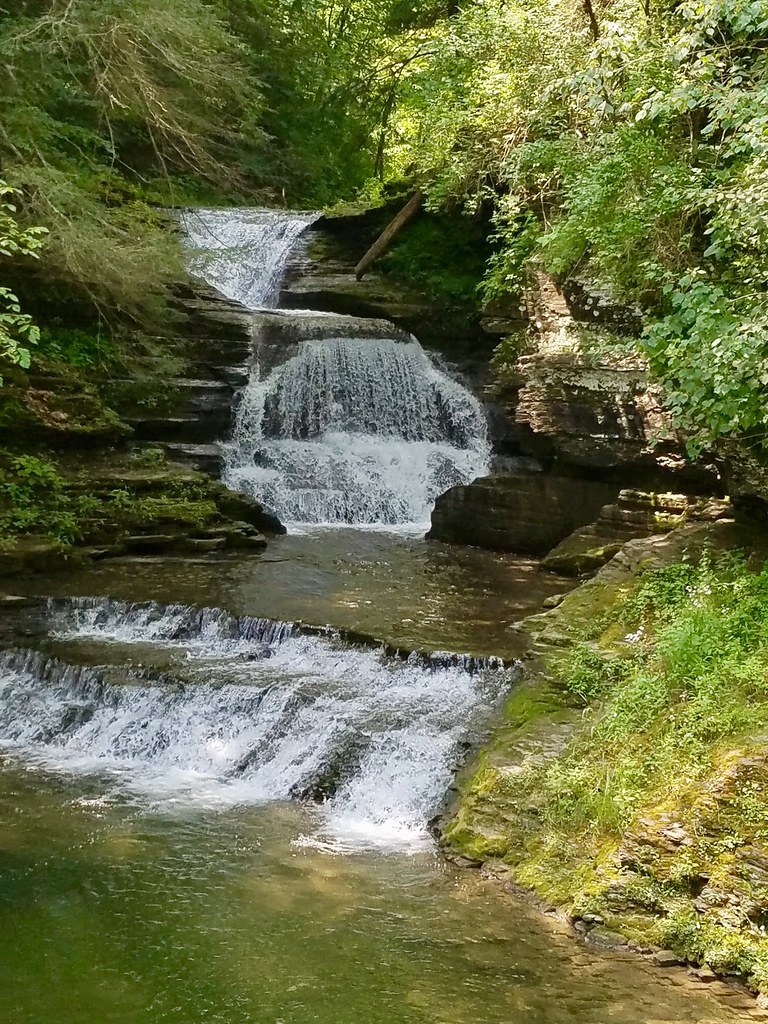Some sources claimed the presence of “over 150 waterfalls within 10 miles” of Ithaca, New York. I guess it depends on how they’re defined. Even so, waterfalls seemed to pop into view just about anywhere we looked. As numerous T-shirts and bumper stickers around town reminded us, “Ithaca is Gorges.”
We squeezed a lot of interesting places into our brief trip and naturally that included a lot of waterfalls too. They all led to Cayuga Lake, a part of the Great Lakes watershed.
I’m presenting them here in the order that we visited them.
Watkins Glen

Technically the waterfalls of Watkins Glen State Park shouldn’t be included on this list. Visiting them required about a half-hour to drive over to Watkins Glen at the southern tip of Seneca Lake. However, I went there in 2006 and loved them so much I had to return on this trip. I wondered if they could possibly meet oversized expectations from my fading memories. Happily, they did.
Few walks anywhere could top the Watkins Glen Gorge Trail (map) for the sheer concentration of amazing features crammed into such a confined space. Nineteen spectacular drops and cascades lined a narrow slot of less than a mile and a half. Sure, we had to push through hordes of tourists. These falls attracted tourists for a reason. I’ll come back again during the off-season someday and appreciate them with a bit of solitude.
Cascadilla Gorge

The Cascadilla Gorge (map) cut through the southern edge of Cornell University. It offered a scenic path between campus and downtown, a part of the Cornell Botanic Gardens. Water dropped about 400 feet (122 metres) along the length of the gorge in a series of steps.
I wondered about the name, Cascadilla. One source claimed “it most likely comes from Spanish, meaning ‘little waterfall.’” That seemed reasonably plausible although I couldn’t prove it. The cascades seemed most impressive as a collection, several falling from respectable heights although none really overshadowing the rest. I could see how some would view them as a set of “little” falls (relatively speaking) all lined up sequentially.
We saw a Cascazilla beer (yes, with a Z) at Ithaca Brewing. They explained, “The name CascaZilla (Cas-kuh-zil-uh) is a play on both the name of the gorge in Ithaca called Cascadilla and the monster amount of Cascade Hops we use while dry hopping during the brewing process.” So, I figured like Godzilla?
Wells Falls

Along Six Mile Creek, below the overpass on Giles Street, stood one of the more obscure cascades within Ithaca; a feature called Wells Falls (map). It also went by an unusual alternate designation, Businessman’s Lunch Falls. Apparently, with its proximity to downtown, it became a “popular lunch spot for downtown office workers.” That seemed a little far-fetched to me because it would take a mile-long walk in both directions plus a descent down a dusty path curling around a steep hill. Maybe people in Ithaca get longer lunch breaks than I do. I don’t know. I did enjoy the surprisingly secluded spot so close to the roadside, though.
Old ruins lining one side of the falls hinted at an industrial past. A mill stood there in the 19th Century. A water pumping station later occupied the site as the 20th Century dawned. Only a collapsing multi-story brick building and its huge rusty pipes remained.
Ithaca Falls

An impressive waterfall crashed 150 ft (46 m) down the appropriately named Fall Creek (map). We got to this one quite easily too, practically in the middle of Ithaca. A small parking lot led to a short trail. Only one waterfall in town could be named Ithaca Falls. This one’s convenient location probably led to it claiming it.
Industrial activity took place here too. Several mills and factories stood shoulder-to-shoulder at the spot around the turn of the last century, using these rushing waters as a power source. One of them, the Ithaca Gun Company (still in existence), lasted here until 1987. Unfortunately it also left a lot of lead residue behind, contaminating the soil. Signs warned people to wash up after visiting.
Triphammer Falls

Also on Fall Creek although a little farther upstream stood Triphammer Falls (map). This one could be visited quite easily too, smack in the middle of the Cornell University campus. A pedestrian bridge offered a handy observation post. Some of the natural falls remained. The remainder was formed by a man-made dam fashioned to look like a waterfall that held scenic Beebe Lake behind it. The whole conglomeration descended about 55 ft (17 m).
I wondered about the name of this one too so I looked up the definition of a triphammer. Merriam-Webster defined it as, “a massive power hammer having a head that is tripped and allowed to fall by cam or lever action.” Wikipedia had a nice video of one in action being used to forge metal. A triphammer forge once stood at the site, using water power to operate the hammer, so the falls earned its name honestly.
Lucifer Falls

Then we headed a bit farther out from Ithaca to Robert H. Treman State Park on Enfield Creek, in a town of the same name. We entered on the western side of the park and hiked along a gorge trail (map) built by the Civilian Conservation Corps during the Great Depression. That brought us down to Lucifer Falls, with its impressive 115 ft (35 m) drop. The trail led all the way down to its base, then crossed Enfield Creek, and looped back up to the other rim of the gorge. It required a little more physical activity to appreciate than most of falls we visited that weekend. However, I certainly didn’t mind the hike even with the excessive humidity.
Old Mill Falls

Finally, we visited Old Mill Falls, at the same park. This one could be found near the parking lot on the western side, on Fish Kill Creek near its confluence with Enfield Creek (map). That placed it about a half-mile upstream from Lucifer Falls. It would have been the main attraction in a lot of parks although we’d seen so many spectacular falls by this point that it seemed rather ordinary. I did enjoy the 1830’s grist mill off to its side that gave the feature its name.
People familiar with Ithaca probably noticed I didn’t mention two of the area’s most impressive waterfalls, Taughannock and Buttermilk falls. I visited both of them in 2006 so we skipped them. We only had so much time.
See Also: The Complete Photo Album on Flickr

Leave a Reply